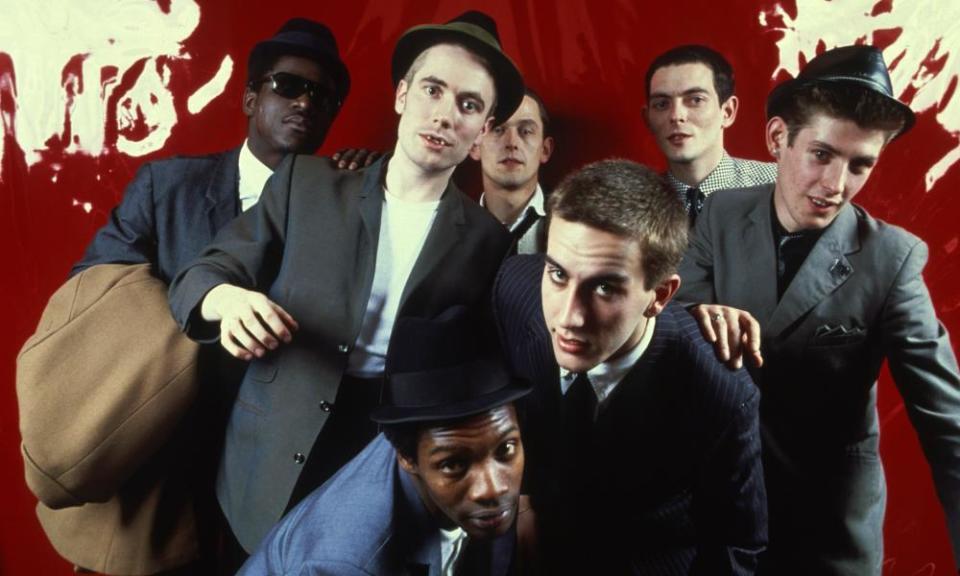The 100 greatest UK No 1s: No 2, The Specials – Ghost Town

In early 1981, the Specials were both at the top of their game and in their death throes. They had enjoyed a dizzying, agenda-setting rise to fame. Seven top 10 singles and two gold albums in two years; an entire youth subculture formed in their wake; a record label, 2 Tone, that seemed to guarantee success for anyone who signed to it: Madness, the Selecter, the Beat, the Bodysnatchers.
But the Specials were falling apart. They were overworked and riven with internal disagreements about the jazz and easy-listening-influenced direction leader Jerry Dammers was taking them in. They were a band born out of political and racial tension. They had changed their name from the Coventry Automatics and started playing a punky take on ska, with lyrics pleading for racial tolerance and unity, after a 1978 gig supporting the Clash was disrupted by the National Front. But now political and racial tension was threatening to engulf them. Guitarist Lynval Golding was seriously injured in a racist attack in south London. Gigs on their late 1980 tour were marred by audience violence: in Cambridge, Dammers and vocalist Terry Hall were arrested and charged with incitement to riot after trying to stop the fighting. The band announced they would quit touring.
Things came to a head in the studio while trying to record their next single, Ghost Town, a song Dammers had spent a year writing, horrified by what he had seen on the road: “In Liverpool, all the shops were shuttered up, everything was closing down. Margaret Thatcher had apparently gone mad, she was closing down all the industries, throwing millions of people on the dole. You could see that frustration and anger in the audience. It was clear that something was very, very wrong.”
Ghost Town was powered by despair and anger, both at the state of a country in which unemployment had risen by nearly a million in 12 months, and by 82% among ethnic minorities – “government leaving the youth on the shelf, no jobs to be found in this country” – and the state of the Specials (“Bands won’t play no more / too much fighting on the dancefloor”). It was all set to deeply unsettling, doom-laden music: a loping reggae beat topped with eerie, jazz chords, stabbing horns influenced by soundtrack composer John Barry and, instead of a chorus, a harrowing wail. The band fought so much during its recording that the studio engineer threatened to throw them out. Ghost Town was eventually completed and released in late June, around the same time the Specials played a benefit show in their home town of Coventry, inspired by the racist murder of a local teenager, Satnam Gill. The NF marched through the city on the same day; rumours they were also planning to attack the gig meant one of the biggest bands in the country found themselves playing to a half-empty venue.
The day before Ghost Town reached No 1, Britain erupted. There had been riots in Brixton the previous month, sparked by a new police stop-and-search policy named Operation Swamp 81 after Margaret Thatcher’s 1978 assertion that the UK “might be rather swamped by people of a different culture”: 943 people – the vast majority of them black – were stopped by plainclothes officers in six days.
On 10 July, a second wave of rioting spread across the country: Brixton, Southall, Battersea, Dalston, Streatham and Walthamstow in London, Handsworth in Birmingham, Chapeltown in Leeds, Highfields in Leicester, and many other cities including Edinburgh, Luton, Sheffield, Portsmouth, Preston, Newcastle, Derby, Southampton, Nottingham, Wolverhampton, Stockport and Cardiff all reported “riots” of varying degrees. In the past, No 1 singles had occasionally alluded to recent events or a prevalent mood – the blissed-out ambience and dippy logic of the Summer of Love was encapsulated by Procul Harum’s A Whiter Shade of Pale and the Beatles’ All You Need Is Love; a sense of trepidation around the moon landings found a voice in David Bowie’s Space Oddity and Zager and Evans’s In the Year 2525 – but nothing before had developed the terrible currency of Ghost Town, and nor has anything since.
Related: The Specials: ‘Respect people. Be kind to people. What else have we got?’
Backstage at Top of the Pops for their No 1-crowning performance, Hall, Staples and Golding announced they were leaving the band: the Specials effectively broke up. Over the following 39 years, there have been reformations and recriminations of varying degrees of seriousness. And, over the same period of time, 2 Tone has slipped into the realm of BBC Radio 2 and TV advert soundtracks, stripped of its fraught context and connotations, a cheery, nostalgic knees-up embodied by A Message to You Rudy and Our House: “Britain at its Best”. But Ghost Town hasn’t made the same journey. It was the Specials’ biggest hit and one of the biggest-selling singles of 1981. Its sound seems to presage a lot of subsequent music – you can hear its gloomy echoes everywhere from Massive Attack to Burial – but you almost never hear it on the radio or TV. Perhaps it’s too bleak, too disturbing, its tone too hopeless: a reminder of something we’d rather forget. It sits in the past, brooding and glowering at us, its remarkable, dark power undimmed.

 Yahoo Finance
Yahoo Finance